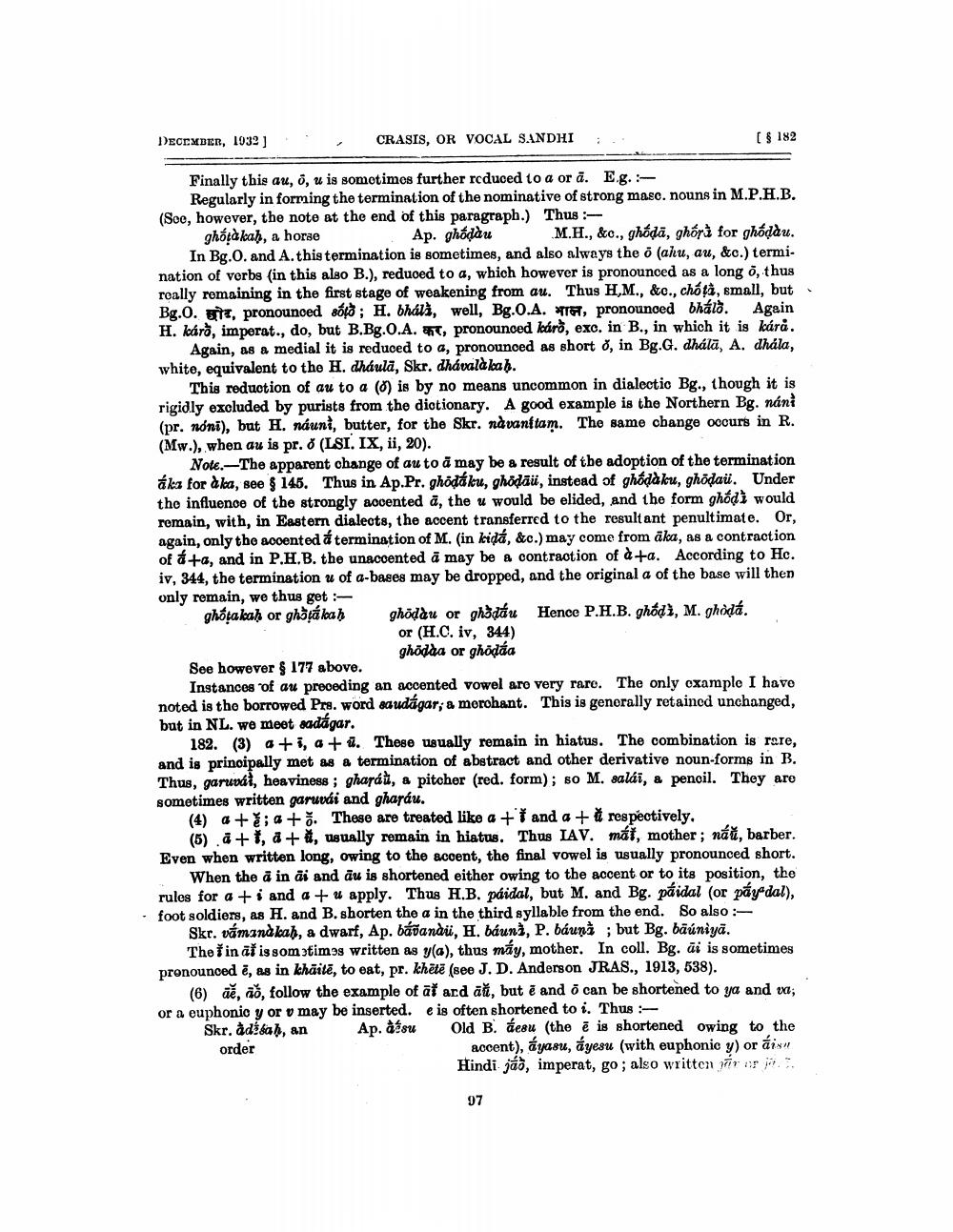________________
DECEMBER, 1932)
.
CRASIS, OR VOCAL SANDHI
($ 182
Finally this au, o, u is sometimos further reduced to a or a. E.g.
Regularly in forming the termination of the nominative of strong masc. nouns in M.P.H.B. (Soo, however, the note at the end of this paragraph.) Thus -
chốtà kah, a horse . Ap. chốạàu M.H., &c., ghếạã, ghorn for chốạàu.
In Bg.O. and A.this termination is sometimes, and also always the 7 (ahu, au, &c.) termination of verbs (in this also B.), reduoed to a, which however is pronounced as a long 7, thus really remaining in the first stage of weakening from au. Thus H,M., &c., chótà, small, but Bg.o. ne, pronounced 86; H. bhál), well, Bg.0.A. TIG, pronounced bháld. Again H. káro, imperat., do, but B.Bg.0.A. 4, pronounced káro, exc. in B., in which it is kárå.
Again, as a medial it is reduced to e, pronounced as short o, in Bg.G. dhálā, A. dhála, white, equivalent to the H. dháula, Skr. dhávala kah.
This reduction of au to a () is by no means uncommon in dialectic Bg., though it is rigidly excluded by purists from the dictionary. A good example is the Northern Bg. nánt (pr. nóni), but H. náuni, butter, for the Skr. navanftam. The same change occurs in R. (Mw.), when au is pr. 0 (LSI. IX, ii, 20).
Note. The apparent change of auto à may be a result of the adoption of the termination áks for a la, see $ 145. Thus in Ap.Pr. ghódáku, ghödāü, instead of ghódáku, ghodai. Under the influence of the strongly accented a, the u would be elided, and the form ghód) would remain, with, in Eastern dialects, the accent transferred to the resultant penultimate. Or, again, only the accented a termination of M. (in kidá, &c.) may come from aka, as a contraction of áta, and in P.H.B. the unaccented à may be a contraction of à ta. According to Hc. iv, 344, the termination u of a-bases may be dropped, and the original a of the base will then only remain, we thus get ghóalah or ghəyá kah ghöddu or ghdadu Hence P.H.B. ghód), M. ghoda.
or (H.C. iv, 344)
ghôdaa or ghódáa See however $ 177 above.
Instances of au preceding an accented vowel aro very rare. The only example I have noted is the borrowed Prs. word saudágar; a merchant. This is generally retained unchanged, but in NL. we meet sadágar.
182. (3) ati, a + U. These usually remain in hiatus. The combination is rare, and is principally met as a termination of abstract and other derivative noun-forms in B. Thus, garuvát, heaviness; gharáu, a pitcher (red. form); 50 M. salái, a pencil. They are sometimes written garuvái and gharáu.
(4) a+ ;a + . These are treated like a + f and a + respectively.
(5) a+t, & + , usually remain in hiatus. Thus IAV. mát, mother; náč, barber. Even when written long, owing to the ecoent, the final vowel is usually pronounced short.
When the à in äi and äu is shortened either owing to the accent or to its position, the rules for a + i and a + # apply. Thus H.B. páidal, but M. and Bg. páidal (or páy dal), foot soldiers, as H. and B. shorten the a in the third syllable from the end. So also
Skr. vámand kah, a dwarf, Ap. báðandi, H. báuni, P. báuni ; but Bg. bāúniya.
The tin at is som stimas written as y(a), thus máy, mother. In coll. Bg. āi is sometimes pronounced ē, as in khāitē, to eat, pr. khētë (see J. D. Anderson JRAS., 1913, 538).
(6) dě, ao, follow the example of at ard aš, but ē and i can be shortened to ya and va; or a euphonic y or v may be inserted. e is often shortened to i. Thus
Skr. àdésah, an Ap. aisu Old B. áesu (the is shortened owing to the order
accent), á yasu, á yesu (with euphonic y) or áin Hindi jád, imperat, go; also written wir er
97




